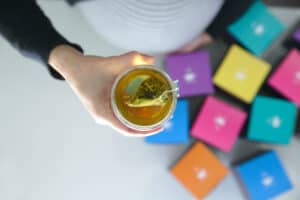How Tea can be a Natural Support in Labour Preparation
Bethan Thomas
Founder of HotTea Mama
Tea Science Degree, Fujian University of Forestry and Agriculture, China
Instagram @hotteamama
Summary
Tea is a great way to naturally support your body and mind when you are preparing for labour. It can be such a daunting time, that settling down to relax with a cup of delicious tea, can do wonders for your nerves, but more importantly, the right herbs and flowers can support you even more than this. This will cover how tea can naturally support you with birth preparation in the third trimester – from raspberry leaf to calming chamomile and lavender.
Uterine Strength- The Final Push Raspberry Leaf Tea
Raspberry leaves have been used for millennia by women to support them in the final stages of their pregnancy and there are studies that suggest it has a positive effect on labour.
Raspberry leaves have been used for millennia by women to support them in the final stages of their pregnancy and there are studies that suggest it has a positive effect on labour.
A study involving rats found that when fragrine is placed on tissue from pregnant rat uteri, it causes contractions to occur1. Fragrine is a key active component of raspberry leaf tea and is therefore believed that some women experience Braxton hicks’ contractions when they drink raspberry leaf tea.
A placebo-controlled trial2, consisting of 192 low-risk women in Australia found that when taking raspberry leaf tea from 32 weeks until labour, had no adverse effects for mother or baby. However, of note, it found a lower rate of forceps deliveries (19.3% vs. 30.4%). A study including the same authors3 found of 108 mothers; 57 (52.8%) consuming raspberry leaf products, whereas 51 (47.2%) were in the control group. They had an unexpected finding of a reduced likelihood to receive an artificial rupture of their membranes (“having their waters broken”) and decrease the likelihood of post-term gestation (“going over-due”).
The recommendation is drinking one cup of tea a day from 32 weeks, then increasing to 2 cups a day after 1-2 weeks, and then to 3 cups a day after a further 1-2 weeks. However, it is always best to consult your midwife or doctor, who may recommend you wait beyond 32 weeks due to how it may affect your uterus.
Relaxation- Night Owl
The thought of labour can sometimes make you feel anxious, and a cup of this tea can help reduce anxiety and hopefully aid a better night’s sleep. It’s the perfect accompaniment to hypnobirthing to help you feel calm and relaxed.
Chamomile flowers
Whole chamomile flowers are used as the base of the blend. The main reason for this is that this powerful bloom has a hugely long history of use to aid sleep, and studies show it is also much more effective than a placebo at reducing feelings of anxiety and depression.
Research has shown that chamomile can decrease anxiety both in the long and short term as well as depression, with a demonstration of its long-term effect on those with generalized anxiety disorder in a placebo-controlled trial. They found that the chamomile group had 40% fewer anxiety relapses during their treatment period4.
Lavender
Like chamomile, lavender has a long history of being used to bring calm and aid sleep. This long history of anecdotal evidence is backed up in a literature review on the efficacy of lavender5. The aromatic compound in lavender is high in linalool, which has been tested and shown to reduce feelings of anxiety. But interestingly, breathing in lavender is less effective than consuming it5. Therefore, having a drink of tea with lavender in it will be more effective than simply breathing in a pillow spray.
Valerian root
Valerian has a strong sedative effect when taken in large amounts, so it is added to the blend only in a small quantity. This is to ensure it is safe for pregnancy and breastfeeding, a study was undertaken in Sweden6 where the effects of herbal drugs were studied, showed no adverse effects on women through pregnancy.
Limeflowers
This tiny flower has very little research done on it but has been used for millennia to create a tea or fragrant baths, to ease anxiety and aid sleep. It has considerably less scientific research done on it, but given its subtle, citrus flavour, I wanted to include it.

References
- Jing Zheng, Pistilli, M. J., Holloway, A. C., & Crankshaw, D. J. (2010). The effects of commercial preparations of red raspberry leaf on the contractility of the rat’s uterus in vitro. Reproductive sciences (Thousand Oaks, Calif.), 17(5), 494–501. https://doi.org/10.1177/1933719109359703
- Simpson, M., Parsons, M., Greenwood, J., & Wade, K. (2001). Raspberry leaf in pregnancy: its safety and efficacy in labor. Journal of midwifery & women’s health, 46(2), 51–59. https://doi.org/10.1016/s1526-9523(01)00095-2
- Parsons, M., Simpson, M., & Ponton, T. (1999). Raspberry leaf and its effect on labour: safety and efficacy. Australian College of Midwives Incorporated journal, 12(3), 20–25. https://doi.org/10.1016/s1031-170x(99)80008-7
- Mao, J. J., Xie, S. X., Keefe, J. R., Soeller, I., Li, Q. S., & Amsterdam, J. D. (2016). Long-term chamomile (Matricaria chamomilla L.) treatment for generalized anxiety disorder: A randomized clinical trial. Phytomedicine : international journal of phytotherapy and phytopharmacology, 23(14), 1735–1742. https://doi.org/10.1016/j.phymed.2016.10.012
- Appleton, J. (2012) Lavender Oil for Anxiety and Depression: Review of the literature on the safety and efficacy of lavender. Natural Medicine Journal, 4(2). Available at: https://www.naturalmedicinejournal.com/journal/2012-02/lavender-oil-anxiety-and-depression-0
- Holst, L., Nordeng, H., & Haavik, S. (2008). Use of herbal drugs during early pregnancy in relation to maternal characteristics and pregnancy outcome. Pharmacoepidemiology and drug safety, 17(2), 151–159. https://doi.org/10.1002/pds.1527












